人教版英语英语动词的时态用法总结及解析百度文库
高中英语动词的时态和语态用法详解-文档.
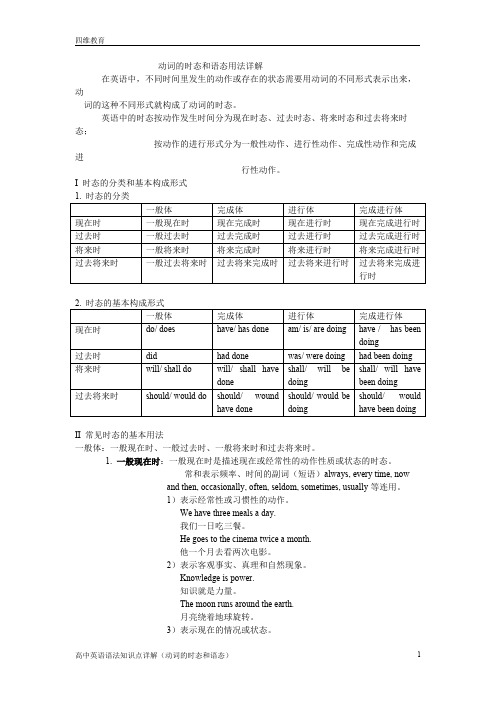
给大家推荐一个英语微信群-Empty Your Cup
英语微信群是目前学习英语最有效的方法,群里都是说英语,没有半个中文,而且规则非常严格,是一个超级不错的英语学习环境,群里有好多英语超好的超牛逼的人,还有鬼佬和外国美眉。
其实坦白说,如果自己一个人学习英语太孤独,太寂寞,没有办法坚持,好几次都会半途而废。
只要你加入到那个群里以后,自己就会每天都能在群里坚持学,坚持不停地说和练,由于是付费群,群里的成员学习氛围非常强,每天的训练度都非常猛,本来很懒惰的你一下子就被感染了,不由自主地被带动起来参与操练,不好意思偷懒,别人的刻苦学习精神会不知不觉影响你,Empty Your Cup英语微信群(进群加喂新 601332975)可以彻底治好你的拖延症,里面学员都非常友好,总是给你不断的帮助和鼓励,让你在学英语的路上重新燃起了斗志,因为每天都在运用,你的英语口语就能得到了迅猛的提升,现在可以随便给一个话题,都能用英文滔滔不绝的发表5分钟以上对这个话题的看法和观点,想提高英语口语的 可以加入进来,It really works very well.。
人教版英语英语动词的时态形式讲解及解析

人教版英语英语动词的时态形式讲解及解析一、初中英语动词的时态1.—Could you tell me what he said just now?—Sorry, I ________ what was happening outside.A.have thought B.was thinking C.thought D.think【答案】B【解析】试题分析:句意:——你能告诉我他刚才说的什么吗?——对不起,我正在想外面发生了什么事。
根据宾语从句是what was happening可知此处用过去时,故排除D项。
根据句意,第二个人也没听见刚才他说的话,因为刚才他正在思考,表示过去某事正在做某事,用过去进行时,故选B。
考点:考查时态的用法。
2.--- Where’s my father? Could tell me?--- He to Beijing. He’ll attend an important meeting.A.goes B.is going C.has gone D.has been【答案】C【解析】【详解】句意:——我的父亲在哪里?可以告诉我吗?——他已经去北京了。
他将参加一个重要会议。
考查动词时态辨析。
根据句意语境,可知父亲不在说话的地点已经去了北京,需用现在完成时,可排除AC两项。
have been to意为“曾经去过某地”,现在已不在那里了;have gone to意为“到某地去了”,说话时作句子主语的人不在现场,故选C。
3.—Do you know what time your uncle Dazhou tomorrow?—At 2∶00 p.m.. I will meet him when he at the airport.A.gets to; arrives B.will get to; will arriveC.will get to; arrives D.gets to; will arrive【答案】C【解析】【分析】【详解】试题分析:句意:——你知道你的叔叔明天将什么时间到达达州吗?——下午两点。
人教版英语英语动词的时态用法总结及解析

人教版英语英语动词的时态用法总结及解析一、初中英语动词的时态1.---Did you watch the program The Voice last night?---I wanted to, but my mother __________her favorite TV play.A.watches B.watched C.was watching D.is watching【答案】C【解析】句意:昨晚你看《The Voice》了吗?——我想看,但是我妈妈在看她最喜欢的电视剧。
下句是解释了当时为何没有观看《The Voice》的原因,是由于当时妈妈在看她最喜欢的电视剧。
在过去的某一时刻发生的动作用过去进行时态来表达,故答案为C。
2.-Has your cousin arrived in Beijing yet?--Yes. She Beijing since yesterday morning.A.arrived in B.has arrived in C.has been in D.has been to【答案】C【解析】句意:你表弟到北京了吗?-是的。
她从昨天起就在北京了。
since yesterday morning自昨天早晨以来,表示的是截止到目前为止的时间段,用于现在完成时态,排除A;arrived为短暂性动词,不能与表示一段的时间状语连用;have been to表示某人去过某地,也不能与表示一段的时间状语连用,故答案为C。
点睛:have(has) been in 表示“在某地呆多长时间”,常与表示一段时间的状语连用,如:since, for, how long 等。
例如:Mr. Brown has been in Shanghai for three days. 布朗先生来上海已经有三天了。
have(has)been to表示“曾经去过某地”,现在已经不在那里了。
可与just, ever, never等连用,例如: I have just been to the post office. 我刚才去邮局了。
初中英语人教版 中考 语法专题 10 动词的时态和语态
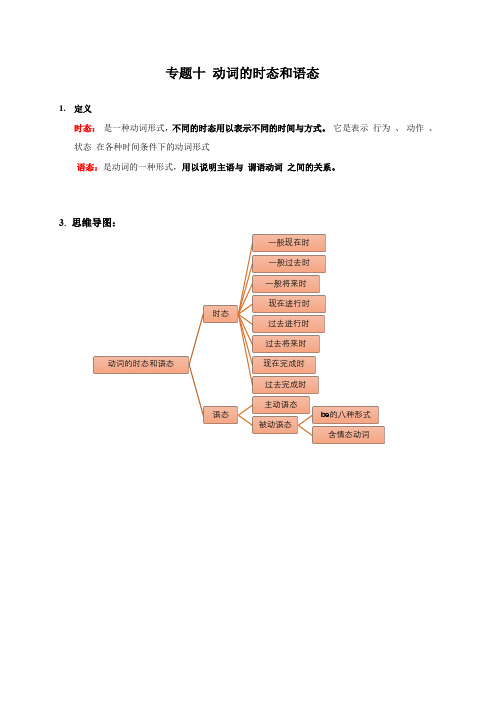
专题十动词的时态和语态1.定义时态:是一种动词形式,不同的时态用以表示不同的时间与方式。
它是表示行为、动作、状态在各种时间条件下的动词形式语态:是动词的一种形式,用以说明主语与谓语动词之间的关系。
3. 思维导图:动词的时态和语态时态一般现在时一般过去时一般将来时现在进行时过去进行时过去将来时现在完成时过去完成时语态主动语态被动语态be 的八种形式含情态动词1.动词的时态1.常考的时态构成及用法a.一般现在时d.现在进行时e.过去进行时f.过去将来时g.现在完成时h.过去完成时2. 动词的语态a. 分类:主动语态:表示主语是动作的执行者被动语态:表示并语是动作的执行者c.主动语态和被动语态的转换规则典型例题总分:50分姓名:得分:1.单选题(每小题1分,共50分)( ) 1. Jenny, together with the Greens the White Tower Park if it tomorrow.A.are going to; isn't rainyB.is going to; doesn't rainC.are going to; won't rainD.is going to; isn't rain( ) 2. The old man for quite some time.A.has diedB.dieC.has deadD.has been dead( ) 3. It is reported that a tall building in the city next year.A.will be builtB.were buildC.have builtD.will build( ) 4. My sister for 2 years.A.has marriedB.have got marriedC.has been marriedD.married( ) 5. Chinese ________in many schools around the world and many people love to learn it.A.teachesB.is teachingC.has taughtD.is taught( ) 6. When Tom was in primary school, he ________the piano every day.A.playsB.playedC.was playingD.has played( ) 7. A baby's first month birthday is a special event in China and _____with a special Party.A.celebratesB.is celebratedC.was celebratedD.will celebrate( ) 8. -Were you at home at 9 o'clock last night?-Yes, I a shower at that time.A.tookB.was takingC.was takenD.am taking( ) 9. National Day celebrations for China's seventieth birthday in about three months.A.will be heldB.will holdC.is heldD.was held( ) 10. We don't know if he tomorrow. If he, I will call youA.will come, will comeB.will come, comeses, will comees, comes( ) 11. He told me that he ______ his uncle in Thailand the next day.A.will visitB.has visitedC.is going to visitD.would visit( ) 12. -Tom, do you know ________? -In Beijing.A.where will the 24th Winter Olympics be heldB.where the 24th Winter Olympics will holdC.where the 24th Winter Olympics will be heldD.where will the 24th Winter Olympics hold( ) 13. Peter with his classmates ________ for the bus when the earthquake happened.A.is waitingB.was waitingC.are waitingD.were waiting( ) 14. his museum ________ here for over 80 years. It ________ one of the oldest buildings in this city.A.is; wasB.had been; isC.was; has beenD.has been; is( ) 15. -Mrs. Brown, how long can books from the school library ?-At most two weeks.A.borrowB.keepC.be borrowedD.be kept( ) 16.-An AI robot _____in our school dining hall next term.-I'm looking forward to it.A.will useB.will be usedC.is usedD.was used( ) 17. Usually a baby's face ____ smooth.A.is feelingB.feltC.feels likeD.feels( ) 18. She _____ an English magazine when I came in.A.readsB.has readC.will readD.was reading( ) 19. I will call you as soon as he______ here.A.arriveB.will arriveC.arrivesD.arrived( ) 20. Boys and girl, ______ learning and have fun!A.keepB.to keepC.keepingD.kept( ) 21. There ______a basketball game between these two grades in the gym this afternoon.A.willB.is going to haveC.is going to beD.will have( ) 22. We ______TV from seven to nine last night.A.were watchingB.will watchC.watchedD.watch( ) 23. Jack's mother taught me how ________ Yunnan rice noodles last weekend.A.to makeB.makingC.makeD.to making( ) 24. Mrs. Green said the plates ________ right away,or they would become difficult to wash.A.will be washedB.should washC.will washD.should be washed( ) 25. The documentary Under the Dome (《苍穹之下》)which ________ by Chai Jing showed us that the air pollution in China was very serious.A.producesB.producedC.is producedD.was produced( ) 26. -What did you do last night?- I ________ my homework and watched TV.A.didB.doC.am doingD.will do( ) 27.The hospital is very famous. It _______ in 2001.A.buildsB.builtC.was builtD.is built( ) 28.These rules are made the disabled.A.protectB.protectedC.to protectD.protecting( ) 29. -How much does the TV ?-Not too much. It's just a second-handed one.A.costB.spendC.takeD.pay for( ) 30. -Have you ever ________ an amusement park?- Yes, I have ________ Fun Times Amusement Park last year.A.been to, have gone toB.gone to, have been toC.go to, went toD.been to, went to( ) 31.We are glad to hear that the terrorists ________ by the brave policemen several days ago.A.are caughtB.were caughtC.have been caughtD.are going to be caught ( ) 32. -Why didn't you go to the party last night? - Because I _____.A.wasn't invitedB.didn't invitedC.haven't invitedD.don't invited ( ) 33. -What _____ you supposed ____ when you are in China?- You should shake hands.A.are, to doB.do, to doC.are, doingD.have, to do( ) 34. So far, we ________ English for three years.A.have learntB.learnC.learntD.had learnt( ) 35.The boy was made ______ the words again and again.A.copyB.copyingC.copiesD.to copy( ) 36. The sports meeting in our school now.A.being heldB.is havingC.is holdingD.is being held( ) 37. The window ____ ten minutes ago, and the room is bright now.A.can be cleanedB.is cleanedC.was cleanedD.will be cleaned( ) 38. -Oh, Mrs. King, your necklace looks nice. Is it new?-No, I _______ it for 2 years.A.hadB.have hadC.boughtD.have bought( ) 39. He has ordered a watch on line for his father and it _______ to him before Father's Day.A.sendB.will be sentC.was sentD.sent( ) 40. There ______ a funny cartoon on CCTV 6 this evening.A.willB.will haveC.is going to beD.is going to have( ) 41. -________ did your uncle leave his home town? -He ___________ for nearly twenty years.A.When, has leftB.When, has been awayC.How long, has leftD.How long, has been away ( ) 42. My uncle ________ Germany on business many times.A.has been onB.has gone toC.has been toD.has been in( ) 43. Her life ________ a lot during the last three years.A.changedB.changingC.has changedD.will change( ) 44. -Lisa was seen ______ an old man go across the street this morning. -What a kind girl she is!A.helpingB.helpedC.to helpD.helps( ) 45. My computer has broken down. I'll get it _______ this afternoon.A.repairsB.repairedC.to repairD.repairing。
动词八大时态用法以及练习总结精华
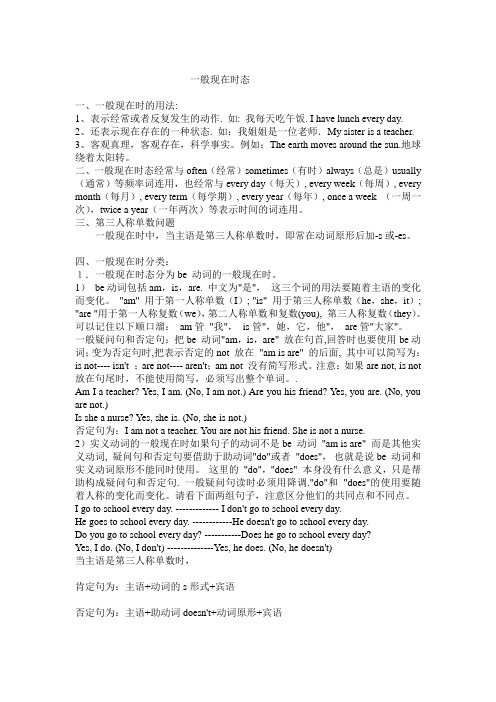
一般现在时态一、一般现在时的用法:1、表示经常或者反复发生的动作. 如: 我每天吃午饭. I have lunch every day.2、还表示现在存在的一种状态. 如:我姐姐是一位老师.My sister is a teacher.3、客观真理,客观存在,科学事实。
例如:The earth moves around the sun.地球绕着太阳转。
二、一般现在时态经常与often(经常)sometimes(有时)always(总是)usually (通常)等频率词连用,也经常与every day(每天), every week(每周), every month(每月), every term(每学期), every year(每年), once a week (一周一次),twice a year(一年两次)等表示时间的词连用。
三、第三人称单数问题一般现在时中,当主语是第三人称单数时,即常在动词原形后加-s或-es。
四、一般现在时分类:1.一般现在时态分为be 动词的一般现在时。
1)be动词包括am,is,are. 中文为"是",这三个词的用法要随着主语的变化而变化。
"am" 用于第一人称单数(I); "is" 用于第三人称单数(he,she,it); "are "用于第一人称复数(we),第二人称单数和复数(you), 第三人称复数(they)。
可以记住以下顺口溜:am管"我",is管",她,它,他",are管"大家"。
一般疑问句和否定句:把be 动词"am,is,are" 放在句首,回答时也要使用be动词;变为否定句时,把表示否定的not 放在"am is are" 的后面, 其中可以简写为:is not---- isn't ;are not---- aren't;am not 没有简写形式。
初中英语知识归纳总结——动词的时态

初中英语知识归纳总结——动词的时态动词的时态(一)教学重点一般现在时在英语中,不同时间里以不同方式发生的动作或存在的状态,要用不同的动词形式来表示,动词的这种不同形式称为动词的时态。
时态从时间上划分,可分为四大类:现在时;过去时;将来时;过去将来时。
从行为上,每一类可以分为四种形式:一般式;进行式;完成式;完成进行式。
这样英语的动词合起来,总共有十六种时态,初中只需掌握其中的八种时态。
1、一般现在时(1)一般现在时表示现在的状态、习惯性的动作或主语所具备的性格和能力等。
①当动词是be时,第一人称用am,第二人称用is,其他人称用are.②当动词是实义动词时,一般用动词原形,但如果主语是第三人称单数时,动词必须用第三人称单数形式,其变化规则如下:助动词do(第三人称单数用does)构成否定句、疑问句及答语,但要注意助动词后原来的谓语动词要恢复原形。
例如:I like music.I don’t like music.Do you like music?Yes, I do No, I don’t(2)一般现在时的用法①表示经常、习惯性动作,常和often, usually, every day, sometimes, always 等时间状语连用。
如:He goes to school by bus every day.They often play football②表示能力、职业、特征。
如:Miss Gao teaches English.Do you speak Japanese?③表示客观存在。
如:The earth moves round the sun.Time and tide wait for no man.④表示已经安排好或计划好的事。
如The plane takes off at 7:30.Classes begin at 8:00⑤在时间状语和条件状语从句中,主句用一般将来时,从句用一般现在时。
人教版英语英语动词的时态的用法大全含解析

人教版英语英语动词的时态的用法大全含解析一、初中英语动词的时态1.--Look! There____ so many noisy kids in the room!--Haven’t you heard the saying “When the cat is away, the mice _____?”A.have; play B.is; are going to playC.have; are playing D.are; will play【答案】D【解析】【详解】句意“-看!房间里有许多吵闹的小孩-你没听见他们在说,当猫离开后,这些老鼠在玩吗?”。
there be句型不与have连用,排除A和C,且第一空处主语为so many noisy kids,谓语用复数,排除B,第二空处when引导的从句用一般现在时,主句用一般将来时,即“主将从现”原则,故选D。
2.— Who the classroom tomorrow, Tony?— Our group.A.will clean B.cleans C.cleaned D.clear【答案】A【解析】句意:——托尼,明天谁打扫教室?——我们小组。
考查一般将来时。
根据提示词tomorrow可知时态用一般将来时,其构成为:will+动词原形;故答案选A。
3.By the time I ________ on the TV, Beckham ________ two goals.A.turned; have scored B.turned; had scoredC.had turned; have scored D.had turned; had scored【答案】B【解析】句意:当我打开电视的时候,贝克汉姆已经进了两个球。
考查动词时态辨析题。
本句是时间状语从句,by the time到…时候为止,用于一般过去时,可排除CD选项。
从句用一般过去时,主句用过去完成时,需用“had+过去分词”结构,可排除A;根据句意结构,可知选B。
人教版英语动词时态用法总结(完整)

一、选择题1.My hand ________ and I will have my clothes ________.A.hurt; to wash B.is hurt; wash C.hurts; washed D.is hurt; washing2.—When ________ you ________ reading the book Little Women?—It's hard to say. I'm busy these days and have no time to continue reading.A.did; finish B.have; finished C.will; finish D.do; finish 3.“81192”, the number of Wang Wei’s plane, ________ up on many Chinese media outlets to remind us of our hero on April 1 every year.A.showed B.showing C.to show D.shows4.—I want to know if he ________ back tomorrow.—I’ll call you as soon as ________.A.will come; will return B.will come; returnsC.comes; will return D.come; returns5.Very little of the house _________ now because it caught fire last week.A.remains B.is remaining C.is remained D.remained 6.David ________so hard. He is always the first to come and the last to leave.A.will work B.works C.worked D.was working 7.It seldom snows in winter here,_______?A.does it B.doesn’t it C.do it D.don’t it 8.Wars are disasters. A large number of people will lose their homes if a war . A.breaks out B.is broken out C.will break out D.will be broken out 9.—Do you think if Tom _____the work well tomorrow?—I think he will if he ______his best.A.does, will try B.will do, tries C.does, tries D.will do, will try 10.Not only my classmates but also our English teacher Chinese poems, so we often share their favourite ones.A.like B.liked C.likes D.liking11.—I’d like to borrow a book. Its name is “Travel around the world”.—Let me check on the computer first. Oh, it _____________ that Kate has got it.A.says B.is said C.has said D.was said 12.An increased concentration of carbon dioxide and certain other gases in the Earth’s atmosphere ______ global warming.A.contributing to B.contribute toC.contributes to D.to contribute to13.There ________ a big tree and many flowers in front of my house now.A.is B.are C.was D.Were14.The Small Goose Pagoda in Xi’an, one of the 22 Silk Road relics located in China, _______ back in 707 during the Tang Dynasty.A.dated B.was datedC.dates D.is dating15.---I don’t know if Aunt Li to look after these“stay-home children”tomorrow morning.---If he ,I will phone you.A.comes;will come B.comes;comes C.will come;will come D.will come;comes 16.—How much are the two pairs of shoes?—They are not expensive. I think fifty dollars ______ enough.A.is B.are C.were D.was 17.—Excuse me! You can’t take photos here. Look at the sign “NO PHOTOS”.—Sorry, I ________ it.A.don’t see B.am going to see C.didn’t see D.won’t see 18.The real reason why prices ________, and still are, too high is hard to understand, and no one can explain this problem.A.were B.would be C.have been D.will be19.— Jenny, why do you look so tired today?—I didn’t slee p well. Because I _________ for my dad to come back for three hours. A.waited B.have waited C.am waiting D.was waiting 20.—I know Lisa is your best friend. Do you see much of each other now?—No! She ________ in New York for ten years, but now she lives in Los Angeles.A.lives B.has lived C.lived D.is living21.— Have you heard of Yangzhou Horticultural Expo? It is showing gardens around the world.— Yes. I ________ it with my parents the other day.A.visit B.visited C.will visit D.have visited 22.—I don't care ________. In this army, there's only one hairstyle—short! Understand?—Yes, sir!A.what you are used to liking B.what you used to be likeC.what are you used to liking D.what did you use to be like23.— Why didn't you answer my call?— sorry. I _______ an old friend and we _______all the time.A.have met; are talking B.met; talked C.met; are talkingD.met; were talking24.—The moon ________ its first female astronaut by the year 2024.—Wow, this will truly be a remarkable moment in history.A.has welcomed B.is welcomed C.welcomed D.will welcome 25.--- Do you like the new pen?--- Yes, it _______ very well.A.is written B.writes C.is writing D.has written 26.With globalization sweeping the world, learning foreign languages will become increasingly necessary if a country _________ economically.A.will compete B.is to competeC.were to compete D.competes27.More than one official _____ the people heart and soul, which makes the public satisfied. A.serves B.serveC.serves for D.sever for28.To our surprise, Tom and John, neither of whom regular training, very excellent. A.have gone through; is B.has gone through; areC.have gone through; are D.has gone through; is29.This sort of clothing material, which feels soft, ______.A.catches fire easily B.is caught fire easilyC.is easy caught fire D.is easily to catch fire30.The fact that so many people still smoke in public places____ that we may need a nationwide campaign to raise awareness of the risks of smoking.A.suggest B.suggests C.suggested D.suggesting31.—I ________ so busily recently that I ________ no time to help you with your maths.—That’s OK. I can manage it by myself.A.have been working; have B.have worked; hadC.am working; will have D.had been working; had had32.I want to buy that kind of cloth because I_____the cloth_____well.A.have told;washed B.have been told;washesC.have been told;washed D.was told;washes33.—Why are you so upset?—I had my computer repaired yesterday, but it ________ work again.A.doesn’t B.didn’tC.won’t D.wouldn’t34.Around two o’clock every night, Sue will start talking in her dream. It somewhat ________ us. A.bothers B.had bothered C.would bother D.bothered 35.— Do you like the skirt?— It _______ soft.A.is feeling B.feltC.feels D.is felt36.We’ll go to play with snow if it ______ tomorrow.A.snow B.snowsC.will snow D.snowed37.Her parents require that she ________ her homework before she ________ TV.A.will finish; watches B.finishes; watchesC.finish; watches D.finishes; will watch38.The house, which _____ last night, ____ my aunt but she doesn’t live there any more. A.was broken into; is belonged to B.broke into; is belonged toC.broke into; belonging to D.was broken into; belongs to39.So far, Mike has spent about $28,000 on the house and __________ it to cost about $38,000 when it is finished and furnished.A.expected B.expectsC.has expected D.will expect40.Your donation greatly appreciated and the money will be used to help the students from poor families.A.has been B.isC.was D.had been41.Usually Beijing Roast Duck _____ together with special pancakes, green onions and sweet sauce.A.was served B.will serveC.is served D.served42.Our country has launched a campaign to ban smoking in public places, which with some heavy smokers.A.concerns B.was concernedC.concerned D.is concerned43.—Tu Youyou proves with hardships _______ great honor.—Sure. Opportunities favour the prepared mind.A.comes B.will come C.is coming D.are coming44.---Alan seems a lot taller than when I last saw him.---He . He’s grown a foot since you saw him in Shanghai.A.is B.will beC.has been D.was45.He’s been informed that he ________ for the scholarship because of his academic background.A.hasn’t qualified B.had n’t qualifiedC.doesn’t qualify D.wasn’t qualifying46.The number of people who______ English as a foreign language_______ more than 750 million.A.learns; is B.learn; are C.learns; are D.learn; is 47.Many a woman______ important positions in society, which________impossible in the past.A.holds; was B.hold ; were C.held; was D.holding; were 48.I would be happier if you did more studying while you are free, but you ___________. A.don’t B.didn’t C.wouldn’t D.weren’t49.Paul could be a very attractive boy but he ______ to his behaviour.A.paid no attention B.were paying no attentionC.pays no attention D.had paid no attention50.With such a tight schedule, everyone will have to go all out if they _____________ the task. A.have completed B.would completeC.will complete D.are to complete【参考答案】***试卷处理标记,请不要删除一、选择题1.C【解析】试题分析:句意:我的手疼,我将让别人给我洗衣服,身体部位疼,用hurt,受伤,be hurt.使某事被别人做,have sth done,故选C。
高中英语动词时态用法详解

高中英语动词时态用法详解时态(Tense)是表示行为、动作和状态在各种时间条件下的动词形式。
因此,当我们说时态结构的时候,指的是相应时态下的动词形式。
英语时态分为16种:一般现在、一般过去、一般将来、过去将来时,以及这四者的进行时、完成时和完成进行时。
下面是16种时态的谓语动词形式和具体用法,高考必考的是前10种时态,同学们需要重点掌握。
1.一般现在时 (do/does; is/am/are)① 表示现在的情况、状态或特征。
例:He is a student.他是一个学生。
② 表示经常性、习惯性动作。
例:He always helps others.他总是帮助别人。
③ 客观事实和普遍真理。
例:The earth moves the sun.地球绕着太阳转。
④ 表示一个按规定、计划或安排要发生的动作。
仅限于某些表示“来、去、动 、停、开始、结束、继续”等的动词,可以与表示未来时间的状语搭配使用 。
常见的用法是:飞机、火车、轮船、汽车等定期定点运行的交通方式。
例:The next train leaves at 3 o'clock this afternoon.下一趟火车今天下午3点开车。
⑤ 在时间、条件和让步状语从句中经常用一般现在(有时也用现在完成时)表示将的来事情。
(即:主将从现原则)例:I will call you as soon as I arrive at the airport.我一到机场就会给你打电话。
When you have finished the report, I will have waited for about 3 hours.等你完成这份报告的时候,我就已经等了将近3个小时了。
2. 现在进行时(am/is/are doing)① 表示此时此刻正在发生的事情。
例:He is listning to the music now.他现在正在听音乐。
② 表示目前一段时间内一直在做的事情,但不一定此时此刻正在做。
动词时态的用法说明(初中英语)

动词时态一、概念:英语中不同时间和方式发生的动作或状态要用谓语动词的不同形式来表示,这种表示动作或状态发生时间和方式的动词形式称作动词时态。
二、动词时态的种类:动词时态共16种,但初中阶段要求掌握的有八种:一般现在时一般过去时现在进行时过去进行时一般将来时过去将来时现在完成时过去完成时三、动词时态的构成:1.一般现在时(do、does);2.一般过去时(did);3.一般将来时( will do)(be going to do);4.过去将来时( would do)/(was/were going to do);5.现在进行时( am/is/are doing);6.过去进行时(was/were doing);7. 现在完成时(have done);8.过去完成时( had done);四、动词时态用法解读:1. 一般现在时1) 经常性或习惯性的动作,常与表示频率的时间状语连用。
时间状语:every…,sometimes,often, always, in the morning. at…,on SundayI leave home for school at 7 every morning.,twice a week2) 客观事实,普遍真理。
The earth moves around the sun.Shanghai lies in the east of China.3) 表示格言或警句中。
Pride goes before a fall.骄者必败。
注意:此用法如果出现在宾语从句中,即使主句是过去时,从句谓语也要用一般现在时。
例:Columbus(哥伦布)proved that the earth is round..4) 现在时刻的状态、能力、性格、个性。
I don't want so much.Ann Wang writes good English but does not speak well.比较:Now I put the sugar in the cup.I am doing my homework now.5﹞主将从现﹝主句用将来时从句用现在时﹞①I will tell you,When Li Ming comes②I'll e-mail you as soon as I get to Beijing.注一般从句为时间状语从句「由When As soon as...引导的从句」条件状语从句「由If...引导的从句」6)表示按计划,规定要发生的动作,但仅限于少数动词如:begin,come,leave,go等The meeting begins at seven.2. 一般过去时1)在确定的过去时间里所发生的动作或存在的状态。
完整版人教版初中英语语法完整总结

完整版人教版初中英语语法完整总结人教版初中英语语法完整总结如下:时态:动词的时态分为一般现在时、一般过去时、一般将来时、现在进行时、过去进行时、现在完成时、过去完成时。
一般现在时(Simple Present Tense):表示经常性活动、习惯或客观事实。
一般过去时(Simple Past Tense):表示过去发生的动作或状态。
一般将来时(Simple Future Tense):表示将来发生的动作或状态。
现在进行时(Present Continuous Tense):表示现在正在进行的动作。
过去进行时(Past Continuous Tense):表示过去某个时间点正在进行的动作。
现在完成时(Present Perfect Tense):表示过去发生的动作对现在造成的影响或一直持续到现在的动作。
过去完成时(Past Perfect Tense):表示过去某个时间点或动作之前已经发生过的动作或状态。
语态:英语中的语态分为主动语态和被动语态。
主动语态(Active Voice):主语为动作的执行者。
被动语态(Passive Voice):主语是动作的承受者。
名词:名词主要负责表示事物的名称和概念。
可数名词(Countable Nouns):表示可以计数的名词,可有单数和复数形式。
不可数名词(Uncountable Nouns):表示不可数的名词,只有单数形式。
复数名词(Plural Nouns):表示复数的名词,可通过在名词后加-s或-es形成。
冠词:冠词主要用于限定名词。
不定冠词(Indefinite Article):a/an,表示泛指。
定冠词(Definite Article):the,表示特指。
形容词:形容词用于修饰名词,表示事物的性质、特征或状态。
比较级与最高级:形容词有比较级和最高级形式,用于比较两个或多个事物的程度。
比较级(Comparative):表示两者之间的比较。
最高级(Superlative):表示三者或以上之间的比较。
(人教版)中考英语总复习语法:专题8-动词的时态、语态(101页)

(2)过去完成时与现在完成时的主要区别是时间参 照点不同: 过去完成时的时间参照点是某个“过去的” 时间;现在完成时的时间参照点是“现在”。因此现在 完成时中的很多规则,也适用于过去完成时。 When I got to the cinema, the film had been on. 当我到达电影院时,电影已经开始了。
以辅音字母+y结尾的动词, 把y变为i再加-ed
以一个元音字母加一个辅音 字母结尾的重读闭音节词, 双写结尾字母再加-ed
study→studied carry→carried stop→stopped drop→dropped prefer→preferred
3.一般将来时 (1)表示将来某个时间要发生的动作或存在的状 态,其构成形式:“will/shall+动词原形”。常与表 示将来的时间状语tomorrow,next week,in+一段时 间等连用。 当主语是第一人称I或we时,问句中一般用shall。
③表单纯性的将来,与人的主观愿望和判断无关 时。 If it's made of wood, it will float on water. 这要是木材做的,它能浮在水面上。 (4)当主句为一般将来时态时,在if,as soon as, until, when等引导的状语从句中用一般现在时代替一 般将来时。 I will call you as soon as I get there. 我一到那儿就给你打电话。
特殊情况:have→has,am/are→is 考查热点:如果主句为一般将来时,if,unless等 引导的条件状语从句和when,until,as soon as等引导 的时间状语从句常用一般现在时表示将来。 What about going climbing if it doesn't rain tomorrow? 如果明天不下雨,去爬山怎么样?
初中人教英语时态

初中人教英语时态一、现在一般时现在一般时表示现在时刻发生的动作或存在的状态。
其基本结构是“主语+谓语+宾语”,例如:I eat an apple every day.二、过去一般时过去一般时表示过去某个时间发生的动作或存在的状态。
其基本结构是“主语+谓语+宾语”,例如:She studied English last year.三、将来一般时将来一般时表示将来某个时间发生的动作或存在的状态。
其基本结构是“主语+will+谓语+宾语”,例如:He will visit his grandparents next week.四、现在进行时现在进行时表示现在正在进行的动作。
其基本结构是“主语+be 动词+谓语动词-ing”,例如:They are playing basketball now.五、过去进行时过去进行时表示过去某个时间正在进行的动作。
其基本结构是“主语+was/were+谓语动词-ing”,例如:They were having dinner at 6 o’clock yesterday.六、将来进行时将来进行时表示将来某个时间正在进行的动作。
其基本结构是“主语+will be+谓语动词-ing”,例如:They will be studying in the library next week.七、现在完成时现在完成时表示过去发生的动作或存在的状态,对现在造成的影响或结果。
其基本结构是“主语+have/has+谓语动词过去分词”,例如:I have finished my homework.八、过去完成时过去完成时表示过去的某个时间点之前已经完成的动作。
其基本结构是“主语+had+谓语动词过去分词”,例如:She had written a letter before she went to bed.。
人教版初三英语动词的时态和语态复习
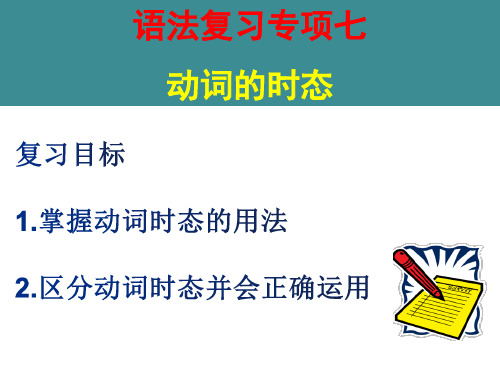
【中考链接】
( ) 1. —I heard your father had gone to Beijing on business.
—Yes. And he ____A___ in three weeks. A. will return B. has returned C. returned D. returns ( ) 2. Just go down this road and you __D_____
等,也常和
等引导的状语从句连用.
★必背句式 It is/has been+一段时间+since+一般过去时
It is/has been five years since he lived in China.
【中考链接】
( ) 1. —Are you going anywhere?
—I __D____ about visiting my sister, but I have changed my mind.
the library next to the bank. A. see B. saw C. have seen D. will see
( ) 3. We ____B___ have a picnic together with our teachers next Thursday.
A. are going B. are going to C. will going D. may going to
B. watches
C.was watching D.watching
3.-----Hey ,what did I say? -----I _________. A. I’m not listening B. I was not listening
人教版九年级英语时态
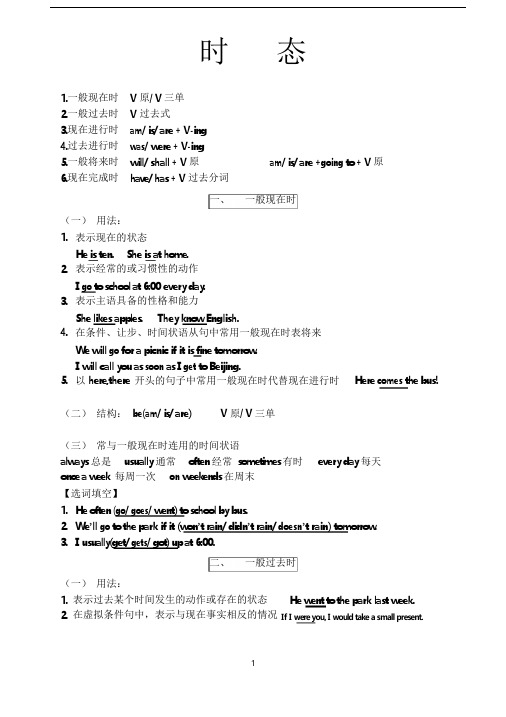
时态1.一般现在时V原/V三单2.一般过去时V过去式3.现在进行时am/is/are+V-ing4.过去进行时was/were+V-ing5.一般将来时will/shall+V原am/is/are+going to+V原6.现在完成时hav e/has+V过去分词一、一般现在时(一)用法:1.表示现在的状态He is ten.She is at home.2.表示经常的或习惯性的动作I go to school at6:00every day.3.表示主语具备的性格和能力She likes apples.They know English.4.在条件、让步、时间状语从句中常用一般现在时表将来W e will go for a picnic if it is fine tomorrow.I will call you as soon as I get to Beijing.5.以here,there开头的句子中常用一般现在时代替现在进行时Here comes the bus!(二)结构:be(am/is/are)V原/V三单(三)常与一般现在时连用的时间状语always总是usually通常o ften经常sometim es有时every day每天once a w eek每周一次on w eek ends在周末【选词填空】1.He o ften(go/goes/went)to school by bus.2.W e’ll go t o the park if it(won’t rain/didn’t rain/doesn’t rain)tomorrow.3.I usually(get/gets/got)up at6:00.二、一般过去时(一)用法:1.表示过去某个时间发生的动作或存在的状态He went to the park last week.2.在虚拟条件句中,表示与现在事实相反的情况If I were you,I would take a small present.(二)结构:was/were V过去式(三)常与一般过去时连用的时间状语yesterday昨天last w eek上周last year去年a moment ago刚才three days ago三天前just now刚才in the past在过去in1998在1998年【选词填空】1.Y esterday he(clean/cleans/cleaned)the room.2.They(go/went)to the park last night.3.He(invents/invented)the p hon e in1945.三、现在进行时(一)用法:1.表示现在(说话瞬间)正在进行的动作He is watching TV now.2.表示当前一段时间内的活动或现阶段正在进行的动作W e are working on a farm these days.(二)结构:am/is/are+V-ing(三)常与现在进行时连用的时间状语now现在at the moment现在at present现在注意:Look!/Listen!后一般用“现在进行时”Look!She is dancing.Listen!He is singing.【选词填空】1.He(reads/is reading/was reading)a book now.2.Listen!They(are talking/was talking).3.Look!T wo girls(dance/are dancing)there.四、过去进行时(一)用法:1.表示在过去某一时刻或某一阶段内正在发生的事情I was playing computer games at9:00last night.2.由when引导的一般过去时的时间状语,当主句的动作为延续性时,则常用过去进行时She was watching TV when I came in.(二)结构:was/were+V-ing(三)常与过去进行时连用的时间状语at this time yesterday昨天这个时候then那时at that time在那时this morning今天早上【选词填空】1.She(is/was)watching TV when I came in.2.They(are/were)singing when the UFO arrived.3.When the alien got out,the girl(is/was)shopping.练习检测【选词填空】1.--What are they doing?–They(are/were)playing tennis.2.–What does your sister like doing?--She(liked/like/likes)singing.3.Mr Green(talked/is talking)t o the manager now.4.Listen!Someone(is singing/are sing).5.I will go out if it(will be/is)sunny tomorrow.6.My mother(cook ed/was cooking)when I came in.st w eek I(go/went)to Beijing.8.He(buys/bought)a pen two days ago.9.What(are/were)you doing when the UFO landed.五、一般将来时(一)用法:1.―will+动词原形‖表示将要发生的动作或情况I will go t o school tomorrow.2.―be go ing to+动词原形‖表示打算进行某活动,或某种迹象表明很可能要发生的事Look at the dark clouds!It’s g oi ng to rain.(二)结构:will/shall+V原am/is/are+going to+V原(三)常与一般将来时连用的时间状语next w eek下周next year明年tomorrow明天in10years10年后in the future 在将来六、现在完成时(一)用法:1.表示从过去某一时刻开始一直延续到现在的状态或动作(常用于延续性动词)I have studied here for2years.2.表示过去已完成的动作,强调对现在的影响或结果(常用于短暂动词)I have finished my homework.(二)结构:hav e/has+V过去分词(三)常与一般现在时连用的时间状语so far到目前为止all day整天for+时间段since+句子/时间点already已经yet仍然just刚刚ever曾经never从不【区别】现在完成时与一般过去时现在完成时强调的是现在的情况一般过去时则和现在不发生联系He has lived here since1992.(现在还住这里)He lived here in1992.(不知现在是否住这里)【区别】hav e/has been去过某地(现已回来)hav e/has gone去了某地(现没回来)我去过长沙很多次。
最新人教版小学英语语法--时态总结
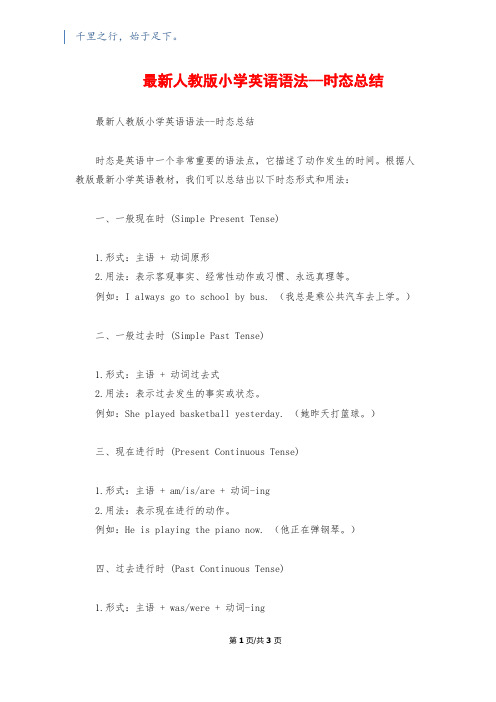
千里之行,始于足下。
最新人教版小学英语语法--时态总结最新人教版小学英语语法--时态总结时态是英语中一个非常重要的语法点,它描述了动作发生的时间。
根据人教版最新小学英语教材,我们可以总结出以下时态形式和用法:一、一般现在时 (Simple Present Tense)1.形式:主语 + 动词原形2.用法:表示客观事实、经常性动作或习惯、永远真理等。
例如:I always go to school by bus. (我总是乘公共汽车去上学。
)二、一般过去时 (Simple Past Tense)1.形式:主语 + 动词过去式2.用法:表示过去发生的事实或状态。
例如:She played basketball yesterday. (她昨天打篮球。
)三、现在进行时 (Present Continuous Tense)1.形式:主语 + am/is/are + 动词-ing2.用法:表示现在进行的动作。
例如:He is playing the piano now. (他正在弹钢琴。
)四、过去进行时 (Past Continuous Tense)1.形式:主语 + was/were + 动词-ing第1页/共3页锲而不舍,金石可镂。
2.用法:表示过去某个时间正在进行的动作。
例如:They were swimming in the pool yesterday. (他们昨天在游泳池里游泳。
)五、将来时 (Future Tense)1.形式:主语 + will + 动词原形2.用法:表示将来要发生的动作。
例如:We will have a picnic tomorrow. (我们明天去野餐。
)六、现在完成时 (Present Perfect Tense)1.形式:主语 + have/has + 过去分词2.用法:表示过去发生的动作对现在造成的影响。
例如:He has finished his homework. (他完成了他的作业。
英语 动词时态 9种 16种 形式 用法 讲解 知识点总结 完整版 最全 归纳 专项
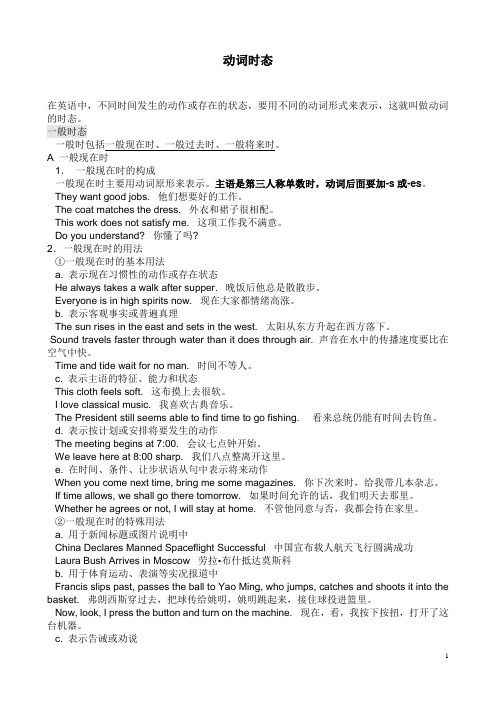
动词时态在英语中,不同时间发生的动作或存在的状态,要用不同的动词形式来表示,这就叫做动词的时态。
一般时态一般时包括一般现在时、一般过去时、一般将来时。
A 一般现在时1.一般现在时的构成一般现在时主要用动词原形来表示。
主语是第三人称单数时,动词后面要加-s或-es。
They want good jobs. 他们想要好的工作。
The coat matches the dress. 外衣和裙子很相配。
This work does not satisfy me. 这项工作我不满意。
Do you understand? 你懂了吗?2.一般现在时的用法①一般现在时的基本用法a. 表示现在习惯性的动作或存在状态He always takes a walk after supper. 晚饭后他总是散散步。
Everyone is in high spirits now. 现在大家都情绪高涨。
b. 表示客观事实或普遍真理The sun rises in the east and sets in the west. 太阳从东方升起在西方落下。
Sound travels faster through water than it does through air. 声音在水中的传播速度要比在空气中快。
Time and tide wait for no man. 时间不等人。
c. 表示主语的特征、能力和状态This cloth feels soft. 这布摸上去很软。
I love classical music. 我喜欢古典音乐。
The President still seems able to find time to go fishing. 看来总统仍能有时间去钓鱼。
d. 表示按计划或安排将要发生的动作The meeting begins at 7:00. 会议七点钟开始。
We leave here at 8:00 sharp. 我们八点整离开这里。
英语动词时态及用法详解

英语动词时态及用法详解英语动词时态是英语语法中的重要组成部分,它能够帮助我们准确地表达动作发生的时间和状态。
在这篇文章中,我们将详细探讨英语中常见的动词时态及其用法。
一、一般现在时一般现在时表示经常发生的动作、习惯性的行为、客观真理或普遍存在的情况。
其构成是主语+动词原形(当主语是第三人称单数时,动词要加“s”或“es”)。
例如:“I go to school every day”(我每天上学。
)“He likes playing football”(他喜欢踢足球。
)一般现在时常用于以下情况:1、表示日常习惯和规律,如“He gets up early every morning”(他每天早上都早起。
)2、表示客观事实和真理,例如“The earth moves around the sun”(地球绕着太阳转。
)3、表示永恒的状态,“Water boils at 100 degrees Celsius”(水在 100 摄氏度沸腾。
)二、一般过去时一般过去时表示过去某个时间发生的动作或存在的状态。
其构成是主语+动词的过去式。
比如:“I saw a movie yesterday”(我昨天看了一场电影。
)“She was happy last week”(她上周很开心。
)一般过去时的使用场景通常有:1、描述过去发生的一次性动作,“I met her at the party last night”(昨晚在派对上我遇见了她。
)2、讲述过去的习惯或状态,“When I was a child, I often played in the park”(当我还是个孩子的时候,我经常在公园玩。
)三、一般将来时一般将来时表示将来要发生的动作或存在的状态。
常见的构成方式有“will +动词原形”和“be going to +动词原形”。
像:“I will visit my grandparents next weekend”(下个周末我将去看望我的祖父母。
(完整版)人教版初中英语八大时态详解

人教版初中英语八大时态详解英语的时态(tense)是一种动词形式,不同的时态用以表示不同的时间与方式。
下面就英语中常见的八种基本时态进行阐述,其它的时态都是在这八种时态的基础上结合而成的。
一、一般现在时:1.概念:经常、反复发生的动作或行为及现在的某种状况。
2.时间状语:always, usually, often, sometimes, every week (day, year, month...), once a week, on Sundays,3.基本结构:动词原形(如主语为第三人称单数,动词上要加(e)S)4.否定形式:am/is/are+not;此时态的谓语动词若为行为动词,则在其前加don't,如主语为第三人称单数,则用doesn't,通常还原行为动词。
5.一般疑问句:把be动词放于句首;用助动词do提问,如主语为第三人称单数,则用does,同时,还原行为动词。
6.例句:It seldom snows here.He is always ready to help others.Action speaks louder than words.二、一般过去时:1.概念:过去某个时间里发生的动作或状态;过去习惯性、经常性的动作、行为。
2.时间状语:ago, yesterday, the day before yesterday, last week(year, night, month…), in 1989, just now, at the age of 5, one day, long long ago, once upon a time, etc.3.基本结构:be动词;行为动词4.否定形式:was/were+not;在行为动词前加didn't,同时还原行为动词。
5.一般疑问句:was或were放于句首;用助动词do的过去式did 提问,同时还原行为动词。
6.例句:She often came to help us in those days.I didn't know you were so busy.三、现在进行时:1.概念:表示现阶段或说话时正在进行的动作及行为。
英语动词时态知识点总结
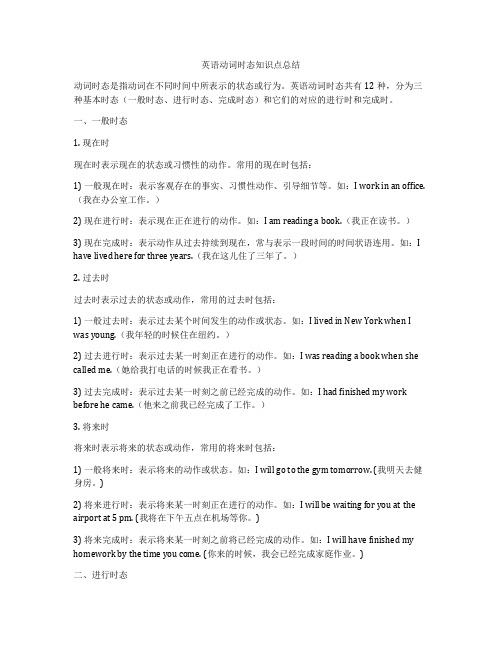
英语动词时态知识点总结动词时态是指动词在不同时间中所表示的状态或行为。
英语动词时态共有12种,分为三种基本时态(一般时态、进行时态、完成时态)和它们的对应的进行时和完成时。
一、一般时态1. 现在时现在时表示现在的状态或习惯性的动作。
常用的现在时包括:1) 一般现在时:表示客观存在的事实、习惯性动作、引导细节等。
如:I work in an office.(我在办公室工作。
)2) 现在进行时:表示现在正在进行的动作。
如:I am reading a book.(我正在读书。
)3) 现在完成时:表示动作从过去持续到现在,常与表示一段时间的时间状语连用。
如:I have lived here for three years.(我在这儿住了三年了。
)2. 过去时过去时表示过去的状态或动作,常用的过去时包括:1) 一般过去时:表示过去某个时间发生的动作或状态。
如:I lived in New York when I was young.(我年轻的时候住在纽约。
)2) 过去进行时:表示过去某一时刻正在进行的动作。
如:I was reading a book when she called me.(她给我打电话的时候我正在看书。
)3) 过去完成时:表示过去某一时刻之前已经完成的动作。
如:I had finished my work before he came.(他来之前我已经完成了工作。
)3. 将来时将来时表示将来的状态或动作,常用的将来时包括:1) 一般将来时:表示将来的动作或状态。
如:I will go to the gym tomorrow. (我明天去健身房。
)2) 将来进行时:表示将来某一时刻正在进行的动作。
如:I will be waiting for you at the airport at 5 pm. (我将在下午五点在机场等你。
)3) 将来完成时:表示将来某一时刻之前将已经完成的动作。
如:I will have finished my homework by the time you come. (你来的时候,我会已经完成家庭作业。
- 1、下载文档前请自行甄别文档内容的完整性,平台不提供额外的编辑、内容补充、找答案等附加服务。
- 2、"仅部分预览"的文档,不可在线预览部分如存在完整性等问题,可反馈申请退款(可完整预览的文档不适用该条件!)。
- 3、如文档侵犯您的权益,请联系客服反馈,我们会尽快为您处理(人工客服工作时间:9:00-18:30)。
人教版英语英语动词的时态用法总结及解析百度文库一、初中英语动词的时态1.--- Will you go to America next month?---Yes. But I promise I will call you as soon as I _________there.A.get to B.will get to C.will get D.get【答案】D【解析】【详解】句意:——下个月你将要去美国吗?——是的。
但是我保证我一到达那里,就给你打电话。
as soon as引导的时间状语从句,用一般现在时,主句用一般将来时。
there是副词,前面不加介词,get there到达那里。
故选D。
2.— Who the classroom tomorrow, Tony?— Our group.A.will clean B.cleans C.cleaned D.clear【答案】A【解析】句意:——托尼,明天谁打扫教室?——我们小组。
考查一般将来时。
根据提示词tomorrow可知时态用一般将来时,其构成为:will+动词原形;故答案选A。
3.Jenny_______in the kitchen when you called her at 5 o'clock this afternoon.A.is cooking B.was cooking C.cooks D.cooked【答案】B【解析】本题难度适中,考查过去进行时,当你昨天5点打电话给她时,他正在煮饭,答案是was cooking,选B。
4.—Do you know _________ the meeting?—Tomorrow morning.A.when they hadB.when they are going to haveC.when did they haveD.when are they going to have【答案】B【解析】【详解】句意:——你知道他们什么时候来开会吗?——明天早上。
此题考查宾语从句,宾语从句要用陈述句语序,C和D是疑问句语序,故排除;根据回答Tomorrow morning可知此句时态是一般将来时,A是一般过去时,B是一般将来时;故选B。
5.—Have you ever been to Singapore, Ann?—Yes. I _________ there for a week with my parents last year.A.have gone B.have been C.went D.was【答案】D【解析】句意:——你去过新加坡吗,安?——去过,去年我和父母在那里呆了一个星期。
have/has gone to表示某人去了某地,现在还没有回来;have/has been to表示某人去了某地,现在已经回来了;但在肯定句中,它们都不能与表示一段的时间状语连用,went 是go的过去式,为短暂性动词,在肯定句中也不能用一段时间状语连用,was there表示状态,可以与一段时间状语连用,答案为D。
6.– Would you like to watch The Great Wall 《长城》with me?-- Certainly. I don’t mind ________ it again although I ______ it twice.A.to see, saw B.seeing, have seen C.to see, have seen D.seeing, saw【答案】B【解析】句意:——你愿意跟我去看《长城》吗?——当然了,尽管我已经看了两遍,但我不会介意再去看一遍。
mind doing sth.介意做某人,结合句意,首先排除A,C;根据"I don't mind ___ it again"和"although"可知尽管我已经看了两遍,但我不会介意再去看一遍.所以看过两遍用现在完成时,答案选B。
7.They their holidays in Paris last summerA.spend B.spentC.will spend D.are spending【答案】B【解析】句意:去年,他们在巴黎度假了。
本题考查动词的时态A. spend 花费,度过,是动词原形 B. spent 度过,是动词的过去式 C. will spend 将要度过,是将来时态 D. are spending。
正在度过,是现在进行时。
根据题意,去年度过的。
故选B。
8.—Do you know what time your uncle Dazhou tomorrow?—At 2∶00 p.m.. I will meet him when he at the airport.A.gets to; arrives B.will get to; will arriveC.will get to; arrives D.gets to; will arrive【答案】C【解析】【分析】【详解】试题分析:句意:——你知道你的叔叔明天将什么时间到达达州吗?——下午两点。
当他到了机场,我会去接他。
get to +地点,到达某地;arrive,到达,如果后面加地点,要加介词in(大地点),at(小地点)。
第一句是宾语从句,根据句意可知用将来时态。
第二句是时间状语从句,主句用将来时,从句用一般现在时。
故选C。
9.Your paper must _______ as soon as the bell _______.A.hand in; rings B.hand in; will ringC.be handed in; rings D.be handed in; will ring【答案】C【解析】【详解】句意“铃声一响,你必须上交你的试卷”。
第一空处,主语为your paper和谓语hand in之间为被动关系,排除A和B。
as soon as引导的从句用一般现在时,主句用一般将来时,即“主将从现”原则,故选C。
10.— Could you tell me ________? I must find him.— Sorry. I have no idea. But he was here just now.A.where Tom was B.where Tom has goneC.where can I find Tom D.where Tom has been【答案】B【解析】【详解】句意:——你能告诉我汤姆去哪儿了吗?我必须找到他。
——对不起,我不知道。
但他刚才在这里。
本题主要考查宾语从句。
根据语境,你能告诉“我”汤姆在哪里吗。
where 引导的宾语从句在句中作 tell 的直接宾语,me 为间接宾语。
宾语从句使用陈述语序,故此处应用“where + 主语 + 谓语”的结构,主语为 Tom,谓语为 be 动词。
故排除C项。
根据语境时态和主句时态保持一致Could you tell me表示请求允许后用现在完成时,has gone是指去某地,没回来;has been指从某地回来了。
结合语境可知,是指Tom去了某地。
故选B。
11.—What do you think of your hometown,Kate?—It a lot.It’s more beautiful than before.A.has changed B.changesC.will change D.change【答案】A【解析】句意:-你觉得你的家乡怎么样,凯特?-它改变了很多,比以前更美丽了。
A. has changed现在完成时态,已改变;B. changes一般现在时态的动词三单形式,改变;C. will change一般将来时态,将会改变;D. change动词原形,改变。
根据语境可知,本句表示过去的动作对现在造成的影响与结果,所以使用现在完成时态,has/have+动词的过去分词。
故选:A。
12.We will go to Tian’anmen Square to watch the raising of national flag if it _________ tomorrow.A.will rain B.rainsC.doesn’t rain D.won’t rain【答案】C【解析】试题分析:句意:如果明天不下雨我们要去天安门广场看升国旗。
根据句意及题干分析if 引导的是条件状语从句,主句是一般将来时态,根据“主将从现”原则,if从句中应用一般现在时态,根据句意是“不下雨”,所以选C。
【考点定位】考查动词的时态。
13.They ________ the coming of the year 2018 when an accident happened.A.were celebrating B.celebratedC.would celebrate D.have celebrated【答案】A【解析】【详解】句意“当事故发生时,他们正在庆祝即将来临的2018年”。
句中的when意为“这时”,这是一个典型的“当……正在进行的时候发生了……”句型,主句用过去进行时,从句就过去时。
答案为A。
14. Alice in Wonderland ___________ for 15 days and many of us like the film very much. A.begins B.has begunC.began D.has been on【答案】D【解析】试题分析:句意:《爱丽丝梦游仙境》已经上映15天,我们当中很多人都非常喜欢这部电影。
根据句中的for 15 days可知该用现在完成时,并且谓语动词必须是延续性动词。
所以选D。
考点:考查延续性动词。
15.—Why didn't you open the door for me just now?—Sorry,I a bath.A.will take B.am taking C.was taking D.take【答案】C【解析】【详解】句意:--刚才你为什么不给我开门?--对不起,我在洗澡。
根据didn't you open the door这里叙述的是过去的事情,根据句意可知该开门的时间正在洗澡,也就是说过去某个时间正在进行的动作,应该用过去进行时。
过去进行时的谓语动词的形式是:was/were+doing,故选C。
16.— We must stop the hunters hunting the Tibetan antelopes(藏羚羊) in Tibet.— I agree with you. If it ________, they will ________ soon.A.goes, disappearB.goes up, are disappearingC.goes on, be disappearedD.goes on, disappear【答案】D【解析】本题考查动词及短语。
